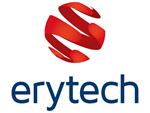ERYTECH Pharma announced presentation of results of two trials evaluating eryaspasein advanced pancreatic cancerat the American Society of Clinical Oncology Gastrointestinal Cancers Symposium on January 21, 2022.
ERYTECH AnnouncesPresentation of
Results of Two Clinical Trials of Eryaspase
in Pancreatic Cancer at ASCO GI
- Interim results from the Phase 1 rESPECT trial of eryaspase plus mFOLFIRINOXasfirst-linetreatment for advanced pancreatic cancer patients, presented in a poster presentation,confirm good safety profile and demonstrate encouraging clinical activity
- Full results from the TRYbeCA-1 Phase 3 trial of eryaspase in second-linemetastatic pancreatic cancer, presented as a late-breaking oral presentation, confirm the top-line results, reported in October 2021, and highlight potential benefit of eryaspase in subgroup of patients treated with FOLFIRI
Cambridge, MA (U.S.) and Lyon (France), January 24, 2021– ERYTECH Pharma (Nasdaq & Euronext: ERYP),a clinical-stage biopharmaceutical company developing innovative therapies by encapsulating therapeutic drug substances inside red blood cells, todayannouncedthe presentation of results of two trials evaluating eryaspasein advanced pancreatic cancerat the American Society of Clinical Oncology Gastrointestinal Cancers Symposium (ASCO GI) on January 21, 2022.
Abstract # 581 - rESPECT: A Phase I dose-escalation study of eryaspase in combination with modified FOLFIRINOX in locally advanced and metastatic pancreatic ductal adenocarcinoma: Interim update (NCT04292743).
Dr Marcus Noel, MD, medical oncologist at Georgetown University Lombardi Comprehensive Cancer Center, Washington, DC, USA, and principal investigator of the rESPECT trial, presented an interim update of this Phase 1 trial evaluating eryaspase in combination with mFOLFIRINOX, a fluoropyrimidine- and irinotecan-based chemotherapy regimen, as first-line treatment for advanced pancreatic cancer.
To date, eleven patients have been enrolled with a mean age of 68. Three patients were enrolled at a dose level of 75 U/kg and eight at a dose level of 100 U/kg. The novel combination of mFOLFIRINOX plus eryaspase was well tolerated and no dose limiting toxicity (DLT) was observed. The maximum tolerated dose (MTD) has been declared with 5-FU 2400 mg/m2, Oxaliplatin 85 mg/m2, Irinotecan 150 mg/m2 and eryaspase 100 units/kg.
Among ten patients with imaging available to evaluate response, 5 (50%) had partial response (PR) and 5 (50%) had stable disease (SD), corresponding to a disease control rate (PR + SD) of 100%. One patient with locally advanced disease became eligible for resection after receiving therapy.
Dr Marcus Noel, MD, Principal Investigator of the rESPECT IST, commented:“The early results from the rESPECT study are highly encouraging for the combination of eryaspase and modified FOLFIRINOX in first-line pancreatic cancer, with the MTD now established and initial signs of clinical activity demonstrated. We plan to expand enrolmenton rESPECT to further evaluate efficacy. Alongside a group of international experts, we are now in the process of potentially considering a larger studyin light of both our experience with rESPECT to date and the results observed inpatients treated with the combination of eryaspase and FOLFIRI in TRYbeCA-1.”
Abstract # 518 - TRYbeCA-1: A randomized, Phase 3 study of eryaspase in combination with chemotherapy versus chemotherapy alone as second-line treatment in patients with advanced pancreatic adenocarcinoma (NCT03665441).
Prof. Pascal Hammel, MD, PhD, medical oncologist at University Paris-Saclay, Hôpital Paul Brousse (APHP), France, and co-principal investigator of the TRYbeCA-1 trial, presented the final results of this Phase 3 trial. The top-line results had been reported in October 2021.
As reported before, the trial did not meet primary efficacy endpoint of overall survival (OS). The median OS for patients treated with eryaspase plus chemotherapy was 7.5 months (95% CI, 6.5-8.3), compared to 6.7 months (95% CI, 5.4-7.5) for chemotherapy alone.
The prespecified subgroup of patients treated with eryaspase and FOLFIRI, a fluoropyrimidine- and irinotecan-based chemotherapy regimen, demonstrated a nominal increase in median OS of 2.3 months versus FOLFIRI alone, from 5.7 to 8 months (HR = 0.81; 95% CI, 0.6-1.1). The FOLFIRI treated patients represented approximately 42% of the patients in this trial.
The treatment was well tolerated, and the addition of eryaspase did not enhance the cytotoxicity of chemotherapy.
Following Prof. Hammel’s presentation, the discussant, Dr Nilofer Saba Azad, MD, Department of Oncology, Johns Hopkins Sidney Kimmel Cancer Center, concluded that TRYbeCA-1 was well designed with appropriate power and stratification factors. Furthermore, the study findings open the possibility for additional study of eryaspase in combination with FOLFIRI in neo-adjuvant, adjuvant and first-line settings.
“While it was initially disappointing to be unable to demonstrate an improvement in survival across the entire population in one of the largest prospective second-line pancreatic cancer studies conducted to date, TRYbeCA-1 has improved our understanding of pancreatic cancer in this setting, and importantly, has also identified a potential utility of the combination of eryaspase with fluoropyrimide- and irinotecan-containing regimens in this difficult to treat cancer. I look forward to furthering discussions with the pancreatic cancer communityon future potential clinical trials with eryaspase,” said Prof. Pascal Hammel, MD, PhD, Co-principal Investigator of the TRYbeCA-1 trial.
Dr Iman El-Hariry, MD, PhD, Chief Medical Officer at ERYTECH, added:“I would like to thank all investigators and patients whoare participating and have participated in the rESPECT and the TRYbeCA-1 studies. Pancreatic cancer remains very difficult to treat with few treatment options, but we have been encouraged by the clinical activity observed with eryaspase in both trials. We continue to evaluate the path forward for potential further clinical development focused on evaluating eryaspase in combination with fluoropyrimidine-and irinotecan-based chemotherapy. Meanwhile, the company is currently preparing a BLA to seek approval for eryaspase for the treatment of ALL patients who developed hypersensitivity to E. coli-derived asparaginase, based on the results of a Phase 2 clinical trial sponsored by the NOPHO group1. The Company intends to submit the BLA in the first quarter of 2022, subject to completion of remaining data requested by the FDA.”
About ERYTECH and eryaspase (GRASPA®)
ERYTECH is a clinical-stage biopharmaceutical company developing innovative red blood cell-based therapeutics for severe forms of cancer and orphan diseases. Leveraging its proprietary ERYCAPS® platform, which uses a novel technology to encapsulate drug substances inside red blood cells, ERYTECH is developing a pipeline of product candidates for patients with high unmet medical needs. ERYTECH’s primary focus is on the development of product candidates that target the altered metabolism of cancer cells by depriving them of amino acids necessary for their growth and survival.
The Company’s lead product candidate, eryaspase (GRASPA®), which consists of L-asparaginase encapsulated inside donor-derived red blood cells, targets the cancer cells’ altered asparagine and glutamine metabolism. The proof of concept of eryaspase as a cancer metabolism agent was established in different trials in acute lymphoblastic leukemia (ALL) and pancreatic cancer. An investigator sponsored Phase 2 trial (IST) evaluating the use of GRASPA® in ALL patients who developed hypersensitivity reactions to pegylated asparaginase recently reported positive results, based on which the Company intends to request approval in the United States and potentially other territories. The Company is also pursuing a Phase 1 investigator-sponsored clinical trial in first-line pancreatic cancer.
Eryaspase received Fast Track designation from the U.S. Food and Drug Administration (FDA) for the treatment of advanced pancreatic cancer and treatment of acute lymphoblastic leukemia (ALL) patients who have developed hypersensitivity reactions to E. coli-derived pegylated asparaginase. The FDA and the European Medicines Agency have granted eryaspase orphan drug status for the treatment of pancreatic cancer and ALL.
ERYTECH produces its product candidates for treatment of patients in Europe at its GMP-approved manufacturing site in Lyon, France, and for patients in the United States at its GMP manufacturing site in Princeton, New Jersey, USA. Eryaspase is not an approved medicine.
ERYTECH is listed on the Nasdaq Global Select Market in the United States (ticker: ERYP) and on the Euronext regulated market in Paris (ISIN code: FR0011471135, ticker: ERYP). ERYTECH is part of the CAC Healthcare, CAC Pharma & Bio, CAC Mid & Small, CAC All Tradable, EnterNext PEA-PME 150 and Next Biotech indexes.
For more information, please visit www.erytech.com
CONTACTS
| ERYTECH Eric Soyer CFO & COO | NewCap Mathilde Bohin / Louis-Victor Delouvrier Investor relations Nicolas Merigeau Media relations |
| +33 4 78 74 44 38 | +33 1 44 71 94 94 |
Forward-looking Information
This press release contains forward-looking statements including, but not limited to, statements with respect to the clinical development and regulatory plans of eryaspase including the timing of a potential BLA submission to the FDA for the treatment of acute lymphoblastic leukemia, the Company’s ability to obtain regulatory approval for the treatment of patients with acute lymphoblastic leukemia who developed hypersensitivity reactions to E. coli-derived asparaginase, the Company’s ability to extend the indication scope of eryaspase, the Company’s ability for additional funding under the OCABSA financing agreement or other financing attempts, and the Company’s anticipated cash runway. Certain of these statements, forecasts and estimates can be recognized by the use of words such as, without limitation, “believes”, “anticipates”, “expects”, “intends”, “plans”, “seeks”, “estimates”, “may”, “will” and “continue” and similar expressions. Such statements, forecasts and estimates are based on various assumptions and assessments of known and unknown risks, uncertainties and other factors, which were deemed reasonable when made but may or may not prove to be correct. Actual events are difficult to predict and may depend upon factors that are beyond ERYTECH’s control. There can be no guarantees with respect to pipeline product candidates that the candidates will receive the necessary regulatory approvals or that they will prove to be commercially successful. Therefore, actual results and timeline may turn out to be materially different from the anticipated future results, performance or achievements expressed or implied by such statements, forecasts and estimates. Further description of these risks, uncertainties and other risks can be found in the Company’s regulatory filings with the French Autorité des Marchés Financiers (AMF), the Company’s Securities and Exchange Commission (SEC) filings and reports, including in the Company’s 2020 Document d’Enregistrement Universel filed with the AMF on March 8, 2021 and in the Company’s Annual Report on Form 20-F filed with the SEC on March 8, 2021 and future filings and reports by the Company. Given these uncertainties, no representations are made as to the accuracy or fairness of such forward-looking statements, forecasts and estimates. Furthermore, forward-looking statements, forecasts and estimates only speak as of the date of this press release. Readers are cautioned not to place undue reliance on any of these forward-looking statements. ERYTECH disclaims any obligation to update any such forward-looking statement, forecast or estimates to reflect any change in ERYTECH’s expectations with regard thereto, or any change in events, conditions or circumstances on which any such statement, forecast or estimate is based, except to the extent required by law. In addition, the COVID-19 pandemic and the associated containment efforts have had a serious adverse impact on the economy, the severity and duration of which are uncertain. Government stabilization efforts will only partially mitigate the consequences. The extent and duration of the impact on the Company’s business and operations is highly uncertain, and that impact includes effects on its clinical trial operations and supply chain. Factors that will influence the impact on the Company’s business and operations include the duration and extent of the pandemic, the extent of imposed or recommended containment and mitigation measures, and the general economic consequences of the pandemic. The pandemic could have a material adverse impact on the Company’s business, operations and financial results for an extended period of time.
1DOI: https://doi.org/10.1182/blood-2020-139373
Attachment






